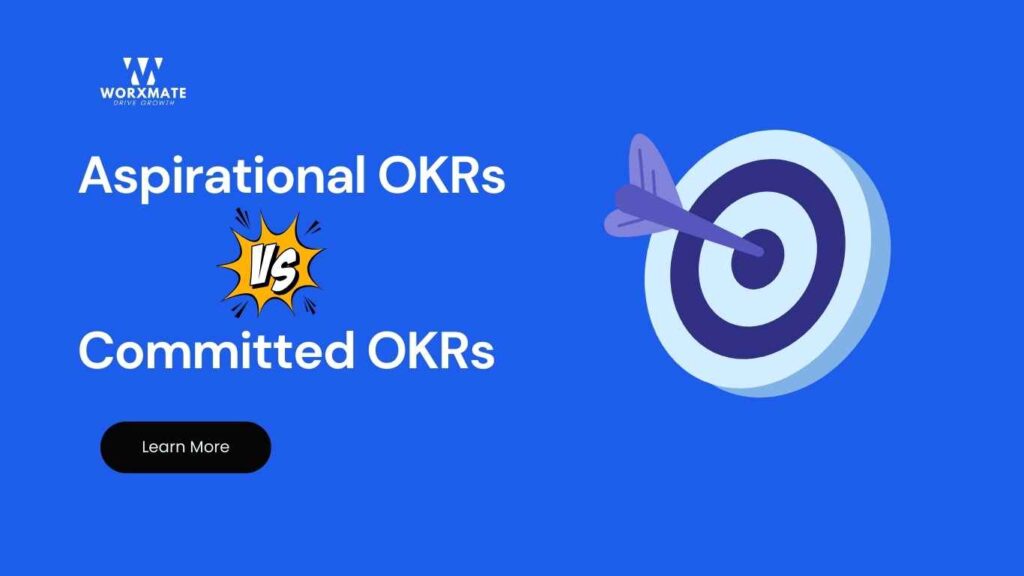Summary :
Aspirational vs committed OKRs is a crucial distinction for organizations seeking both innovation and execution. Committed OKRs are non-negotiable targets that must be achieved, driving accountability and operational focus. Aspirational OKRs, on the other hand, set ambitious, stretch goals that inspire teams to reach beyond current limits, fueling innovation and growth. Striking the right balance between these two OKR types ensures organizations remain both grounded and visionary.
In today’s fast-paced business landscape, setting the right goals is more than just a management ritual-it’s a strategic necessity.
The debate of aspirational vs committed OKRs is at the heart of high-performing organizations. Understanding the difference between these two types of Objectives and Key Results (OKR) can transform your company’s ability to innovate, execute, and grow.
Whether you’re a startup founder, a team leader, or a seasoned executive, knowing when to set ambitious stretch goals and when to focus on must-deliver targets will shape your team’s culture and results.
Aspirational vs Committed OKRs: Key Differences
What Are Committed OKRs?
Committed OKRs are the non-negotiable objectives your team must achieve within a set period. These are the goals everyone agrees to deliver-failure isn’t an option.
Teams allocate resources, adjust schedules, and escalate challenges to ensure these OKRs are met. At the end of the cycle, committed OKRs are evaluated strictly: Did you achieve 100% of the target or not?
Example of a committed OKR:
- Objective: Increase customer retention by 15% this quarter.
- Key Results:
- Reduce churn rate to below 5%.
- Launch a new loyalty program by end of month two.
What Are Aspirational OKRs?
Aspirational OKRs-sometimes called “moonshots” or “stretch goals”-are bold, ambitious objectives that push teams beyond their comfort zones.
These goals are not expected to be fully achieved but are designed to inspire innovation, creativity, and long-term growth.
Aspirational OKRs often lack a clear roadmap at the outset, and success is measured by how far the team progresses toward the goal, not just completion.
Example of an aspirational OKR:
- Objective: Become the market leader in customer experience within two years.
- Key Results:
- Achieve a Net Promoter Score (NPS) of 80+.
- Roll out AI-powered support across all channels.
| Feature | Committed OKRs | Aspirational OKRs |
|---|---|---|
| Definition | Must-deliver, non-negotiable goals | Stretch, ambitious, inspirational goals |
| Success Criteria | 100% achievement required | Partial achievement is acceptable |
| Resource Allocation | Prioritized and secured | May lack full resources initially |
| Impact | Drives operational focus and accountability | Fuels innovation and long-term growth |
| Evaluation | Pass/fail (yes/no) | Progress-based (how far did we stretch?) |
Should OKRs Be Aspirational?
Many leaders ask: Should OKRs be aspirational? The answer depends on your business context and strategic priorities. A balanced OKR system typically includes both types:
- Aspirational OKRs drive teams to think big, challenge the status quo, and achieve breakthroughs.
- Committed OKRs ensure critical business goals are met, maintaining stability and operational excellence.
Organizations that combine both see higher engagement, more innovation, and better results over time.
Aspirational OKR Examples & Committed OKR Examples
Aspirational OKR Example:
- Objective: Revolutionize the onboarding experience for new users.
- Key Results:
- Implement a fully automated onboarding flow with AI-powered tutorials.
- Achieve a 50% reduction in onboarding time.
Committed OKR Example:
- Objective: Deliver Q2 product roadmap on schedule.
- Key Results:
- Release three major features by end of Q2.
- Maintain 99.9% uptime during all deployments.
Case Study: How Leading Companies Balance Aspirational vs Committed OKRs
A 2023 McKinsey report found that organizations using a mix of committed and aspirational OKRs outperformed peers by 30% in innovation metrics and 20% in operational efficiency.
Google, a pioneer of the OKR framework, famously separates its goals into “committed” and “aspirational” buckets, ensuring teams have clarity on what must be delivered and what is meant to push boundaries.
“Committed OKRs are those we agree will be achieved, and we will adjust schedules and resources to ensure delivery. Aspirational OKRs express how we’d like the world to look, even if we don’t know how to get there yet.”
- Google’s OKR Playbook
This approach allows teams to innovate without risking essential business outcomes. Companies that clearly distinguish between the two types see higher morale, more innovation, and stronger alignment across teams.
How Worxmate Empowers Teams with Aspirational & Committed OKRs
Worxmate’s AI-powered OKR software is designed to help organizations define, manage, and track both aspirational and committed OKRs with ease. Here’s how Worxmate supports your goal-setting journey:
- Custom OKR Cycles: Tailor cycles for committed and aspirational goals.
- Performance Analytics: Track progress in real time, identify at-risk OKRs, and adjust strategies.
- Alignment Tools: Link OKRs to daily activities, ensuring everyone is moving in the same direction.
- Collaboration Features: Seamless integration with Slack, Google Workspace, and more for unified teamwork.
- Intelligent Suggestions: AI-driven recommendations for impactful objectives and key results.
Customer Success review:
Parimal Kumar, CEO of Testrig Technologies, shares:
“Our team saw a significant improvement in goal setting and tracking performance thanks to the platform’s intuitive design and seamless integration. It’s user-friendly and has encouraged our employees to align with company goals, boosting outcomes and accountability.”
Conclusion:
Balancing aspirational vs committed OKRs is essential for organizations that want to innovate while delivering results. Committed OKRs drive focus and accountability; aspirational OKRs inspire teams to reach new heights.
With Worxmate’s AI-powered OKR software, you can easily define, track, and align both types of goals-ensuring your teams stay motivated, productive, and strategically aligned.
Ready to elevate your goal-setting?
Start your journey with Worxmate today-sign up for a free trial or book a OKR demo to see how our platform can help your business achieve more.



